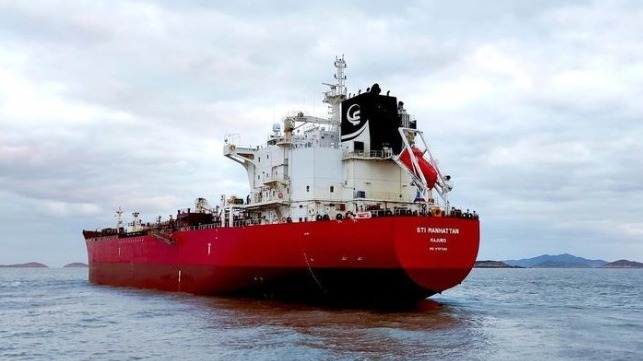Scorpio Tankers Joins Efforts to Develop Shipboard Carbon Capture

Scorpio Tankers, an operator of more than 120 product tankers, is the latest shipping company to announce that it is joining the efforts to develop shipboard carbon capture systems. Experts initially questioned the viability of the technology for ships saying it might be better suited for industrial applications, but a growing number of shipowners, technology companies, and shipyards are reporting progress either with independent technology or combining the carbon capture technologies into existing exhaust filter systems.
Scorpio Tankers is working with a U.S. start-up Carbon Ridge to collaborate on the development of onboard carbon capture for maritime vessels. The agreement addresses the collaboration for detailed front-end engineering, design, and validation process with a small-scale test unit onboard one of the company’s vessels.
“We are pleased to partner with Carbon Ridge and assist in their efforts to reduce the carbon footprint of maritime transportation,” said Emanuele Lauro, Chairman and Chief Executive Officer of Scorpio Tankers. “In light of the myriad questions regarding alternative fuels, we feel that onboard carbon capture presents a viable path to decarbonization for large segments of our industry.”
Carbon Ridge, launched in 2021, is working to develop modular carbon capture and storage technology for the maritime industry. The company points out that onboard carbon capture and storage require an alternative approach to point-source carbon capture compared to conventional CCS technology for stationary emitters. Its efforts are targeting commercializing existing gas separation technology without the need for large structural modifications. Its systems are modular using externally mounted on board vessels, capturing CO2 from the exhaust systems and storing it in cryogenic tanks.
“With a recent push towards well-to-wake accounting for emissions, truly low-carbon alternative fuels will be in limited supply for the foreseeable future,” said Chase Dwyer, Chief Executive Officer of Carbon Ridge. “We believe carbon capture will provide the most cost-effective solution to meet IMO decarbonization targets for the benefit of all stakeholders.”
Last year, two other shipowners reported that they had successfully tested the first shipboard carbon capture systems. Japan’s K Line working with Mitsubishi installed a small-scale CO2 capture plant aboard a five-year-old 88,715 dwt bulk carrier the Corona Utility. The companies reported that the system performed in line with expectations with their measurements showing the captured CO2 had a purity of more than 99.9 percent.

that matters most
Get the latest maritime news delivered to your inbox daily.
Finland’s Langh Tech also reported at the end of 2021 successful early trials of carbon capture and storage on a vessel in normal operations. The tests were carried out aboard one of Langh Shipping’s vessels utilizing the existing Langh Tech hybrid scrubber. Additional alkali was added to the scrubber closed-loop process water to provoke a reaction between the alkali and CO2, effectively capturing the CO2 from the exhaust gas into the process water. Langh says the setup of tests was limited by the capacity of the existing alkali pump, but positive results were observed even with only a slight increase in the alkali dosing.
Several others projects are exploring different methods of either incorporating carbon capture into newbuilds or retrofitting the technology to existing ships. Earlier this month, Samsung Heavy Industries reported it had developed a carbon capture system applicable specifically to LNG-fueled ships. The system, which uses an amine-based liquid absorbent to separate and recover carbon dioxide from the exhaust gas, became the first in Korea to receive approval in principle from the Korean classification society KR. Other shipbuilders, including Daewoo Shipbuilding & Marine Engineering (DSME), have also reported progress with developing carbon capture systems, while Wärtsilä Exhaust Treatment and Solvang ASA, a Norwegian shipping company, are working on technologies expecting their first retrofit to a ship by 2023 to test their carbon capture solution.
